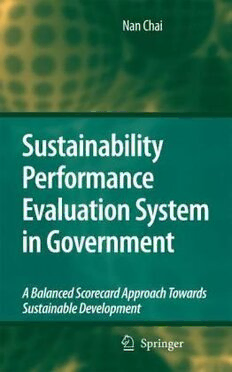Download Sustainability Performance Evaluation System in Government: A Balanced Scorecard Approach Towards Sustainable Development PDF Free - Full Version
Download Sustainability Performance Evaluation System in Government: A Balanced Scorecard Approach Towards Sustainable Development by Nan Chai (auth.) in PDF format completely FREE. No registration required, no payment needed. Get instant access to this valuable resource on PDFdrive.to!
About Sustainability Performance Evaluation System in Government: A Balanced Scorecard Approach Towards Sustainable Development
The principles of modern strategic management are illustrated by an ancient Chinese tale: a man who wanted to go south was in a carriage driving north. A passer-by asked him "If you are going to the south, why is your chariot heading north?" The man answered, "My horse is good at running, my driver is highly skilled at driving a carriage, and I have enough money." Like the Chinese journeyman, the success of today’s organizations and programs not only depends on productivity (good-running horse), workforce capability (highly-skilled driver) and financial support (enough money), but is also determined by their strategic orientation. If the strategy and objectives setting errs from the original mission, operations will be inefficient and ineffective.Progressing towards sustainable development raises significant obstacles to governments wishing to conduct performance evaluations, because at present there are neither generally accepted methods nor specific standards to be met. This book, which evolved from an acclaimed doctoral dissertation, helps overcome these obstacles by developing a set of framework indicators employing a strategic and comprehensive approach called the "Sustainability Balanced Scorecard".As a conceptual basis for the further research and application, this volume will be essential reading for researchers and practitioners involved in environmental and sustainability issues, as well as public management and strategic control studies. Evaluators will find methodological approaches and applied tools for their work, while decision-makers and managers will find this text a valuable resource in managing social, economic and environmental issues in a balanced and integrated manner. Governments will also find it helpful in establishing an evaluation system for sustainable development.
Detailed Information
| Author: | Nan Chai (auth.) |
|---|---|
| Publication Year: | 2009 |
| ISBN: | 9789048130115 |
| Pages: | 190 |
| Language: | English |
| File Size: | 4.529 |
| Format: | |
| Price: | FREE |
Safe & Secure Download - No registration required
Why Choose PDFdrive for Your Free Sustainability Performance Evaluation System in Government: A Balanced Scorecard Approach Towards Sustainable Development Download?
- 100% Free: No hidden fees or subscriptions required for one book every day.
- No Registration: Immediate access is available without creating accounts for one book every day.
- Safe and Secure: Clean downloads without malware or viruses
- Multiple Formats: PDF, MOBI, Mpub,... optimized for all devices
- Educational Resource: Supporting knowledge sharing and learning
Frequently Asked Questions
Is it really free to download Sustainability Performance Evaluation System in Government: A Balanced Scorecard Approach Towards Sustainable Development PDF?
Yes, on https://PDFdrive.to you can download Sustainability Performance Evaluation System in Government: A Balanced Scorecard Approach Towards Sustainable Development by Nan Chai (auth.) completely free. We don't require any payment, subscription, or registration to access this PDF file. For 3 books every day.
How can I read Sustainability Performance Evaluation System in Government: A Balanced Scorecard Approach Towards Sustainable Development on my mobile device?
After downloading Sustainability Performance Evaluation System in Government: A Balanced Scorecard Approach Towards Sustainable Development PDF, you can open it with any PDF reader app on your phone or tablet. We recommend using Adobe Acrobat Reader, Apple Books, or Google Play Books for the best reading experience.
Is this the full version of Sustainability Performance Evaluation System in Government: A Balanced Scorecard Approach Towards Sustainable Development?
Yes, this is the complete PDF version of Sustainability Performance Evaluation System in Government: A Balanced Scorecard Approach Towards Sustainable Development by Nan Chai (auth.). You will be able to read the entire content as in the printed version without missing any pages.
Is it legal to download Sustainability Performance Evaluation System in Government: A Balanced Scorecard Approach Towards Sustainable Development PDF for free?
https://PDFdrive.to provides links to free educational resources available online. We do not store any files on our servers. Please be aware of copyright laws in your country before downloading.
The materials shared are intended for research, educational, and personal use in accordance with fair use principles.

